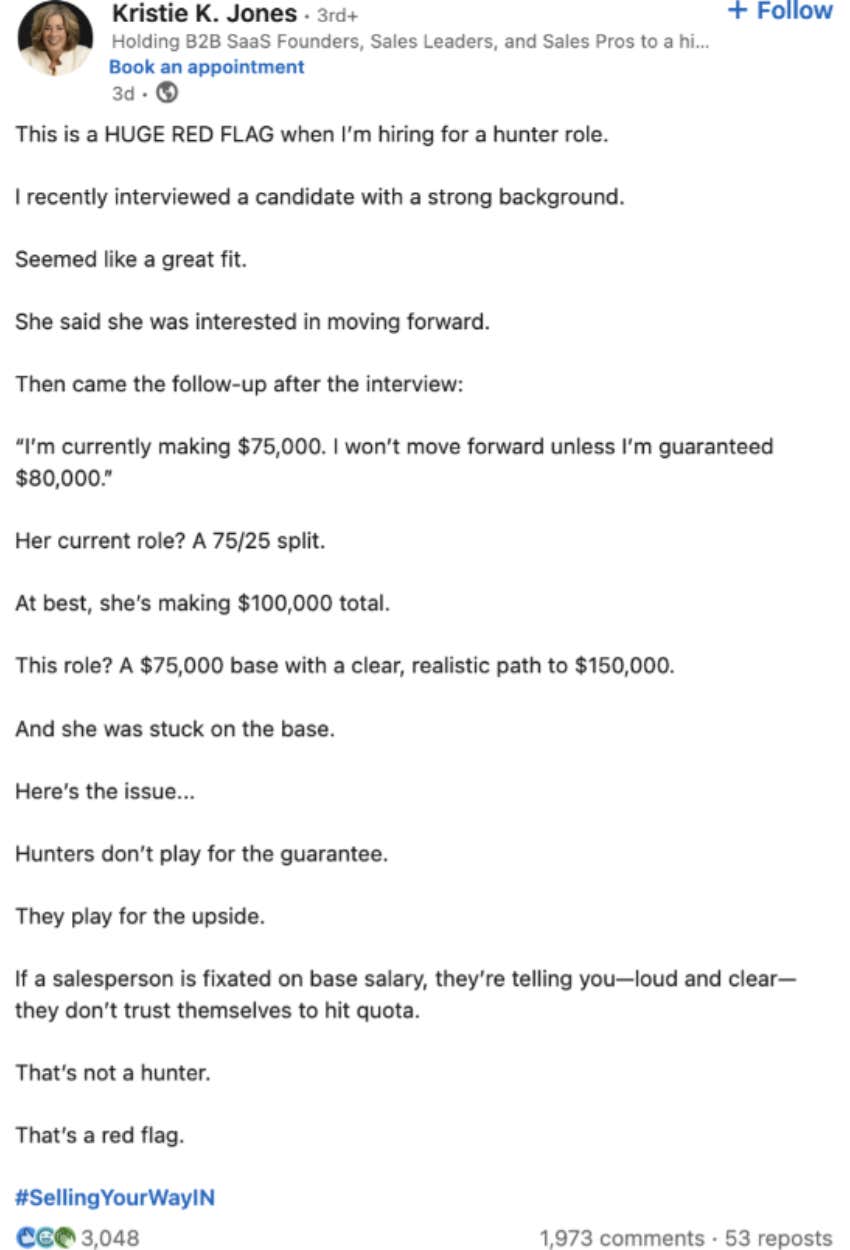Executive Says It’s A ‘Huge Red Flag’ When A Job Candidate Has A Salary Minimum
The job market is so much more complicated nowadays.
 fizkes | Shutterstock
fizkes | Shutterstock Kristie K. Jones, the founder of the B2B SaaS start-up and sales team, was recruiting for a new job opening when the candidate in question shared that she wanted to make $5,000 dollars more than what Jones' company was offering. It was $5,000 more than her current base salary. Not exactly shooting for the moon, but it made Jones angry all the same. She actually rejected the candidate and took her grievance to LinkedIn, where it eventually made its way to Reddit. Basically, everyone ridiculed her notion that a job candidate having a minimum base salary requirement was a red flag.
According to the executive, it’s a ‘huge red flag’ when a job candidate has a salary minimum requirement.
In the Reddit post, the candidate allegedly told Jones that her current base salary was $75,000. She insisted that she wouldn’t move forward with the job unless they offered $80,000. Jones responded by stating that this was the perfect example of someone she wouldn’t hire because she was not a "hunter."
 Reddit
Reddit
Jones told the candidate that she could potentially make $150,000 based on the commission structure, so there was no need to give her a base of $80,000. To add insult to injury, Jones stated that if a potential salesperson was worried about the base salary, then they were basically letting the recruiter know that they wouldn’t be able to "make quotas."
Most commenters agreed that the reason the executive went on the defensive was because she was lying about the earning potential for the role.
One user pointed out that “maybe the candidate doesn’t believe you have the product, solution, or sales plan to get to that $150,000.” Another wisely noted, "Honestly, the interviewer did the applicant a huge solid... If the recruiter and/or the company are that worried about a $5,000/yr difference in base pay, despite the interviewer even admitting they have a 'strong background.' Then most likely, that employer will be doing everything they can to find an excuse not to give you your rightfully earned bonuses, and/or raises... This recruiter is just gaslighting people like their life depends on it..."
It led many to come to the same conclusion: Recruiters and headhunters don’t like to negotiate salary because it makes them feel like they are losing control over the hiring process. They suddenly feel like they are being "hunted" by the applicant rather than the other way around.
What Jones didn’t realize was that the woman she was interviewing was a "hunter" in a sense because she wouldn't take anything less than what she felt she was worth. After all, Jones did refer to her as “a candidate with a strong background.”
The job market is too broken for these types of selective hiring practices.
The current job market is anything but normal. Companies are laying off employees without giving them ample time to have backups in place, the job market is saturated with overqualified candidates, and the employer market is perpetuating the overworked, underpaid job dissatisfaction that has become the norm.
Surprisingly, according to a report by U.S. Bank, as of January 2025, the unemployment rate has remained at 4%, the same since December 2024. So what gives? According to Barron's, what economists and the numbers fail to recognize is the number of professionals struggling to find work that matches their pay and experience.
 Tima Miroshnichenko | Pexels
Tima Miroshnichenko | Pexels
Writing for the outlet, Karishma Vanjani explained, "The data suggest that while new job listings are created, companies are hesitant to fill them amid heightened economic uncertainty and an election that could lead to changes in trade, tariffs, and taxes." Post-election, that uncertainty still stands, perhaps more so.
Jones is part of the problem in this instance. The current market reflects her view. Employees and job candidates should be happy to have a job or even be considered for employment. Salary shouldn't matter.
It's frustrating, to say the least. However, those hiring need to remember that every employee, regardless of where they fall on the corporate ladder, isn't working simply for the pleasure of having a job. They are all working to survive.
Sylvia Ojeda is an author with a decade of experience writing novels and screenplays. She covers self-help, relationships, culture, and human interest topics.

